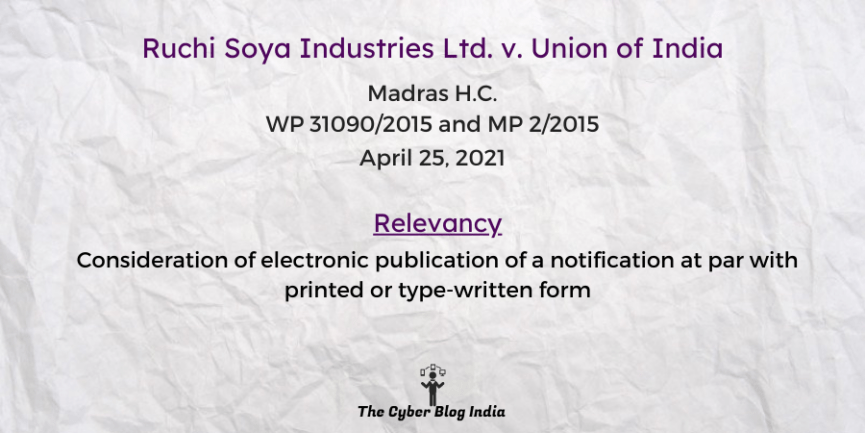Ruchi Soya Industries Ltd. v. Union of India

Ruchi Soya Industries Ltd. v. Union of India
(2021) 377 ELT 432
In the High Court of Madras
WP 31090/2015 and MP 2/2015
Before Justice C. Saravanan
Decided on April 25, 2021
Relevance of the Case: Consideration of electronic publication of a notification at par with printed or type-written form
Statutes and Provisions Involved
- The Information Technology Act, 2000 (Section 4)
- The Constitution of India, 1950 (Article 226, 265, 366(28))
- The Insolvency and Bankruptcy Code, 2016 (Section 3(6), 3(10), 3(11), 5(21), 5(20), 9, 30, 31, 238)
- The Customs Act, 1962 (Section 25, 128)
Relevant Facts of the Case
- The petitioner submitted bills of entry in advance on 15 September 2015 to get customs clearance for the consignment of crude palm oil.
- However, the notification dated September 17, 2015, increased the customs duty from 7.5% to 12.5%.
- The goods arrived in India after the notification. Subsequently, the authority assessed the bills of entry at the revised rates.
- The customs department did not file any claim for recovery of dues from the petitioner during the latter’s insolvency resolution process. The petitioner now seeks to quash the assessment of bills at the revised rate.
Prominent Arguments by the Advocates
- The petitioner’s counsel submitted that the notification was not in force at the time of assessment due to non-compliance with Section 25(4) of the Customs Act, 1962.
Opinion of the Bench
- Electronically available copies have replaced the printed copies of the Official Gazette with advancements in information technology. Therefore, the Central Board of Excise and Customs (CBEC) can publish notifications electronically.
- Electronically published notification in the official gazette is authentic. In addition, it is one of the ways to spread information among the public.
- The notification dated September 17, 2015 was eventually published in the Official Gazette of India and on the website of CBEC.
- Therefore, Section 25(4) of the Customs Act, 1962 no longer holds any relevance. The Finance Act, 2016 has also amended this section. As a result, the publication of the notification in the official gazette is sufficient for its enforcement.
- Section 4 of the Information Technology Act, 2000 states that the electronic form fulfils the requirement for any printed or typewritten form. Hence, the petitioner cannot claim ignorance on the changed rates of duty.
- The National Company Law Tribunal is authorised to provide clarification on the right of the Customs Department to claim pending debts from the petitioner.
Final Decision
- The court disposed of the writ petition and closed miscellaneous applications.
